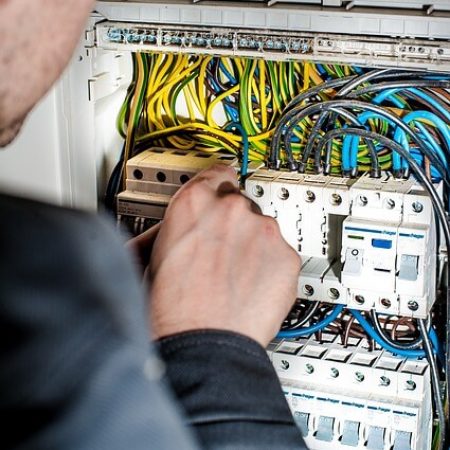Do you have an analytical mind? Do you have a passion for tinkering and fixing things?
If so, then a career as an electrician may be a good fit for you.
Electricity makes the world go round. The average American household consumes about 10,399 kilowatt-hours (kWh) of electricity per year with an average of 877 kWh per month.
As electricity has become an integral part of society’s energy needs, electricians have never been in a better position for career advancement.
Whether you want to work on residential wiring work or more advanced civil, commercial, or industrial project, being an electrician is an extremely useful skill and electricians are indispensable to the functioning of modern society.
Read on to figure out how to become an electrician and get started on an extremely rewarding career path.
What is an Electrician?
Electricians are trained professionals who specialize in maintaining and installing electrical systems in commercial and residential buildings. Keep reading and learn how to become an electrician.
The daily duties of an electrician include:
- Determining the locations of panel boards, outlet and circuits.
- Connecting wires to switches, transformers.
- Reading blueprints.
- Complying with state and local building codes.
- Repairing lighting and electrical control systems
- Diagnosing malfunctioning electrical systems with the use of hand tools and test equipment.
- Inspecting electrical systems
Electricians need to have strong troubleshooting and critical thinking skills as they need to diagnose problems and find the best way to fix them.
Strong communication skills are also necessary as they come in touch with people daily and need to answer their questions in a professional manner.
If you are thinking to follow the road of self-employment, business skills are also required, as you will need to manage payroll, assign projects and keep track of inventory.

Electrician Work Environment
Electricians work indoors, outdoors, at homes, businesses, factories, and construction sites.
Since electricians work in a number of different projects, travel is a large part of the career.
Being an electrician requires long hours of standing/kneeling and working in cramped spaces.
The majority of electricians work full time, which includes evenings and weekends.
Electrical systems are prone to failure so electricians are often required to respond immediately to emergencies.
Most electricians work alone but frequently collaborate as part of a crew, especially on larger projects.
Working with electricity can be very dangerous. As such, electricians must take many precautions to prevent injury.
The most common injuries accrued by electricians are electrical shocks, burns, and other minor injuries. In serious cases, electrical injury can be fatal. This is why electricians must be highly trained and well-versed in electrical theory and the planning of electrical systems.
Becoming an Electrician
Electrician Education Requirements
In general, electricians do not need a college degree.
Most electricians gain their training through apprenticeship programs where they work and get hands-on training under the supervision of professional electricians.
Many electricians begin training by attending courses at vocational schools and then move off to work at an apprenticeship.
Generally, electricians must have at least a high school diploma or GED to be accepted into an apprenticeship program.
A normal electrician apprenticeship takes around 600 hours of in-class instruction on safety principles, electrical circuits and blueprint reading and around 2000 hours practical experience.
As an apprentice you will be working with journeymen electricians on real job sites, learning the tools of the trade and proper workplace regulations.
After completing your apprenticeship, you must pass a state licensing exam before you can work independently as an electrician.
Most states require journeymen electricians to take continuing education courses to stay up to date on techniques and electrical codes.
Lorem ipsum dolor sit amet, consectetur adipiscing elit. Ut elit tellus, luctus nec ullamcorper mattis, pulvinar dapibus leo.
What You’ll Study
Electrician courses tend to be very focused and cover the basics of electrical theory, maintenance, planning, and repair.
As such, you will be required to make use of some math (algebra and trig in particular), physics, and material science.
Along with the theoretical and practical components, electrician programs train you on the proper safety procedures, workplace regulations, and electrical codes.
Common topics covered in electrician courses include:
- Electrical safety
- Principles of DC/AC electricity
- National Electric Code
- Cabling and wiring
- Electrical system design
- Math and physics
- Commercial writing

An electrician is different than an electrical engineer. At the most basic level, electrical engineers are responsible for conceptualizing and designing electrical systems while electricians actually implement and install said systems.
Electrical engineering is more theory focused while electricians focus more on the practical implementation of electrical theory.
Electrical engineers normally require at least a bachelor’s in engineering while electricians usually do not require a college degree.
Training Information & Types of Electrician Degrees
Strictly speaking, being an electrician does not require any degree. It is entirely possible to become an electrician without attending school, as long as you get into an apprenticeship program.
That being said, there do exist education paths for electricians.
The simplest option is to attend an electrician course at a vocational school or technical college to receive an electrician certificate.
Being admitted to an electrician program is normally easier than an apprenticeship if you have no experience and serves as a good baseline for finding apprenticeships after you complete the program.
A typical electrician program takes around 1 year to complete and many electricians complete school while they are working in an apprenticeship.
Electricians can also take an associate’s level program.
The best associate’s programs for electricians make students take courses in fields such as motor control systems, residential electricity, and electrical construction.
The skilled and experienced faculty guide students in the process of learning installation and maintenance techniques.
Associate’s programs often allow students to specialize in a particular subset of electrical systems such as residential grids, factories, construction sites, and industrial power grids.
The credits earned during your associate’s degree can be transferred to get a bachelor’s later.
The being said, the single most important part of your electrician education is your apprenticeship.
As an apprentice, you will be working on-site with professional electricians and getting hands-on practice.
An apprenticeship can take up to 5 years, after which you will be required to test for your electrician license.
Once you finish your apprenticeship and pass the license exam, you will be certified to work as a journeyman electrician.

Option 1: Electrician Certificate
The simplest educational option is to attend an electrician certificate program.
Electrician certification programs cover basic electrical theory and the maintenance and installation for residential, commercial, and industrial properties. Various safety regulations and procedures are also covered.
A certificate program is centered around providing a baseline for seeking employment and apprenticeship programs.
Admission Requirements
The only requirement to apply to an electrician certificate program is to have a high school diploma or GED.
Some programs may require a placement exam to judge your background knowledge and some may require prerequisite courses in high school such as math, physics, and shop.
Make sure to check the specific program for any application prerequisites.
Courses
A hypothetical curriculum for an electrician certificate program might look like:
- National electric code
- Safety practice
- PLC programming and configuration
- Wiring
- Industrial control
- Power distribution
Option 2: Electrician Associate’s Degree
Many community colleges, technical universities, and traditional universities offer associate’s degree programs for electricians.
These programs are normally more in-depth than a simple certificate program and cover a wider range of issues, including more traditionally college core courses like math, physics, statistics, etc.
An electrician associate’s degree normally takes around 2 years to complete, potentially longer if you attend school only part-time.
An associate’s degree in electrical technology is a great way to build your resume to find jobs and apprenticeships.
Admission Requirements
Applying for admission to an associate’s program in electrical technologies is similar to normal university applications.
You will have to send in high school transcripts, letters of recommendation, and standardized test scores (ACT or SAT).
You may also be required to take a placement exam, and some programs require prerequisite courses from high school.
Courses
The course covered in an associate’s level program in electrical technology is largely the same as that for an electrician certificate but to a greater degree of sophistication and complexity.
These courses provide electricians with a wider skill set to work on a wider variety of electrical projects.
Some courses may include:
- Electrical contracting
- Electrical inspection
- Project management
- Electrical code and theory
- Transformers and lighting
- Accident prevention and response
The point of an associate’s degree in electrical technologies is to prepare students and apprentices with the skills needed to succeed in multiple electrician fields.
Option 3: Bachelor’s in Electrical Technology
Although less common, there do exist bachelor’s programs in electrical technology for electricians.
A bachelor’s degree is not required to work as an electrician though many mid-career electricians return to school to earn their bachelor’s which opens up greater potential for career advancement.
Bachelor’s programs in electrical technologies focus more on the theoretical end of electrician work and incorporate many courses that an electrical engineer would take.
Admission Requirements
The admission to a bachelor’s program in electrical technologies is largely the same as admissions to a normal 4-year university.
You will have to send in high school transcripts, standardized test scores, letters of recommendation, and possibly previous work experience.
Courses
Bachelor’s programs have more in-depth courses that are geared toward teaching the fundamentals of electrical theory. Some courses may include:
- Electrical theory
- Digital electronics with lab
- Occupational safety and health
- Civics
- Physical sciences
- Mathematics
- Solid state devices
- Electrical trends and applications
- Specialty courses
- Industrial electronics
- Microprocessors
- Electronic instrument service
- Regulation, policy, and procedures
- Linear and integrated circuits

Online Electrician Programs
Many schools offer online electrician certification programs and associate’s programs.
These courses take advantage of computer software to teach the fundamentals of electrical work from the comfort of your own home.
These courses can be 100% online or be a mixture of online and in-person instruction.
Very often, online courses require students to find internships to make up for the practical and lab components for their courses.
How to Get Your Electrician License
Like most skilled tradesmen, electricians require a license to legally operate.
The exact license requirements differ from state to state but normally involve taking a state-board regulation licensure exam.
While each jurisdiction has its own exam, most of the time these exams contain rules specific to the National Electrical Code (NEC), a national standard for electrical work.
After completing your apprenticeship, you will need to apply for your journeyman license before working.
Once you pass the exam and have your journeyman license you can work as a full-fledged independent electrician.
License Renewal
Most states require electricians to periodically renew their license and maintain their license by taking continuing education courses.
The exact process for license renewal differs depending on the state but normally involves sending in your certification documents, proof of completion of continuing education courses, and any applicable renewal fees.
Operating as an electrician without a license is illegal and can get you in trouble. So make sure to be prompt about renewing and maintaining your license or else you could accrue fees and penalties. If you wait too long to renew your license after it expires you may have to retake the licensing exam.
Summary
Let’s go over the basic steps to becoming an electrician:
Step 1. Complete an electrician certification program
The first step is to complete a basic educational course on electrical technologies.
Earning a certificate will make the search for apprenticeships much easier.
Step 2. Find an apprenticeship
Electricians must first complete a 4-5 year period where they work as an apprentice under the tutelage of a journeyman or master electrician.
An apprenticeship is the most important part of your electrician education as that is where you will learn most of the on-the-job skills required by the profession.
Step 3. Take the licensing exam
The next step is to pass the licensing exam.
The exact test differs from state to state but most often includes content from the National Electric Code.
After passing the licensing exam, you will be a certified journeyman electrician and can work on your own.
Step 4. Maintain/renew your license
All states have rules surrounding maintaining and renewing your license.
You will need to send official licensing documents and proof of continuing education credits.
Electrician Job Growth, Salary & Outlook
The annual median salary for electricians in 2018 was $55,190 ($26.53/hour).
Many electricians are part of a union so job openings typically have good starting salary and benefits.
The field is expected to grow by 9% from 2016-2026, about the average career growth rate.
How Much Does It Cost to Become an Electrician
A certificate program or associate’s degree can run you anywhere between $1,000 – $11,000.
The average apprenticeship costs anywhere from $250 – $1,420 a year, but many apprentices are paid so their salary offsets some of the cost.
A typical licensing exam costs about $30-$75 to take.
How Long Does It Take to Become an Electrician
Electricians are required to finish an apprenticeship before they can work.
A typical apprenticeship takes around 4-5 years to complete.
Factoring a year for a certificate program and a few months to study for the licensing exam, it can take up to 6 years to start working independently as an electrician.
A good portion of this time is spent actually working in the field as an apprentice.
Associations, Groups & Resources for Electricians
- National Electric Safety Code (NESC)
- National Electrical Contractors Association
Frequently Asked Questions
To become a licensed electrician you must pass a state-mandated exam to show you have knowledge of the basic operation, maintenance, and installation of electrical systems.
To become a certified electrician you must first complete and apprenticeship and apply and pass the state-licensing exam. Once you do that you will be a certified electrician.
Master electricians are the highest position in the electrician field and take on the most complex jobs.
You can apply to become a master after you have worked as a journeyman for over 2 years of full-time employment (~4,000 hours).
Master electricians often work in supervisory roles as they have knowledge of most parts of the business. Just like the requirements and licensing exams for journeyman electricians, so too are there licensing exams for master electricians.
Your apprenticeship is the most important part of your electrician education. The best way to get an apprenticeship is to apply with the National Electrical Contractors Association (NECA) which sponsors over 300 joint training apprenticeship programs.
Becoming an electrician is difficult and takes up to 6 years of practice and study.
You must have a logical mind and a knack for engineering-related pursuits.
Most importantly, electricians need practical experience, something that can only be gained over time.
Electricity can be very dangerous so electricians are at risk to a number of potential job hazards, the most common being electrical shocks, burns, and other minor injuries.
Electricians tend to work in tight cramped spaces too so back and leg problems are a possibility.
Accreditation
Accreditation standards differ depending on the specific program, but many electrician programs have national accreditation through one of the following organizations:
- Distance Education Accrediting Commission (DEAC)
- Accrediting Commission of Career Schools and Colleges
- Accrediting Council for Continuing Education and Training (ACCET)
- Accrediting Council for Independent Colleges and Schools
- Council on Occupational Education
While it is not necessary to attend an accredited electrician training program to get a job in the field, employers tend to favor candidates who have completed an accredited training course as well as an official apprenticeship.
Many apprenticeships require applicants to complete at least some parts of electrician training courses.
Completing an accredited program signals to employers that you have a firm grasp on both the theoretical and practical component of being an electrician.


2 Responses
Does an apprentice get a paycheck? Would 20th Century Scholars pay for this training?
Hello I live in RI. Loww rankings for electrical apprentice ships , they are trying to change .but I blame the industry for letting the trade to marg8nalized by union an state interests beset of the worker (apprentice electrician) we are doing the work ,( The SetUp) just let us work( program). We have electrical inspectors for protection of the consumer why do we half to pay twice // cordialy,.paul recupero